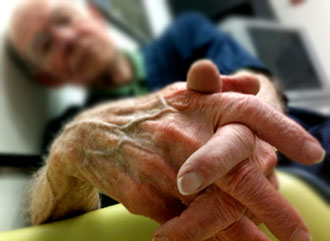PhD Program in Aging Studies Recruits Students
Like a spry 70-year-old chasing balls on a tennis court, the study of the aging phenomenon knows no bounds. Interdisciplinary aging studies is a wide-open, novel field, says Michal Jazwinski, professor of medicine and director of the Tulane Center for Aging.

As the world's population ages, the Tulane Center for Aging is dedicated to enhancing research, education and practice related to aging issues from the individual to the global level. (Photo by Paula Burch-Celentano)
The new interdisciplinary PhD program in aging studies begins at Tulane this fall, and Jazwinski is recruiting doctoral candidates with various interests, from biochemistry to history, epidemiology to music therapy, to be in the initial class.
From the molecular to the societal, from consumer buying habits to housing needs, from investigations into the causes of cognitive impairment to the development of techniques to improve agility of mind and body, the study of aging is inherently interdisciplinary, says Jazwinski, who is holder of the John W. Deming, MD, Regents Chair in Aging.
"We want our students to identify those problems that can only really be perceived from a couple of different vantage points," says Jazwinski.
Thirty-eight faculty members from all of Tulane's schools are associated with the Center for Aging.
Jazwinski's goal is to get the new graduate students and current faculty members fired up to work on research related to aging issues.
Seventy-seven million people in the United States alone are due to retire in the next 20 years. But it's not just the industrialized world that is aging. As the global birthrate slows, populations in underdeveloped countries are getting older, too.
And the people in this emerging cohort don't anticipate living like their grandparents, says Jazwinski. Baby boomers aren't going to be content with sitting in a rocking chair or traveling around the country in a recreational vehicle.
"Go to any tennis court," says Jazwinski, "and you'll see people around the age of 70. They want to be active, even if their bodies have changed."
